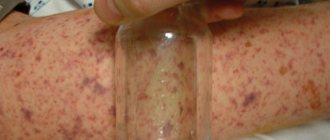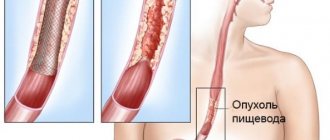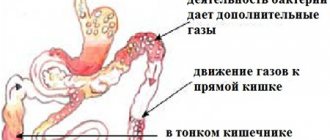Stomach pain after poisoning: what to do and how to treat it, diet
Poisoning, as a rule, does not go away without a trace, and a number of symptoms appear over some time, including pain. If your stomach hurts after poisoning - what to do in such cases, what measures to take, when you need to see a doctor - this will be discussed in the article.
Causes of pain and characteristic symptoms
Poisoning is the most common pathology among the population, especially in the summer. They may be caused by poor quality food, chemicals, alcohol, or medications.
Characteristic symptoms are nausea, vomiting; foodborne infections are characterized by diarrhea, increased body temperature, and intoxication phenomena.
In severe cases, dehydration and exhaustion may develop.
Under the influence of microorganisms, toxins or irritating chemical factors, the stomach always suffers in any poisoning, so pain occurs that can bother you for some time even after other symptoms disappear. Their main reasons are:
- development of the inflammatory process in the mucous membrane under the influence of bacteria - gastritis;
- damage to the gastric wall by toxins;
- irritation and chemical burns of the mucous membrane - alcohol, acid and other substances;
- exacerbation against this background of chronic diseases - gastritis, duodenitis, peptic ulcer;
- reflex spastic contractions of smooth muscles as a response from the stomach and intestines, accompanied by cramping pain.
Painful sensations arise as a result of irritation of nerve endings (receptors) in the mucous membrane, as well as spastic contractions of the gastric muscles, and can have a different character.
When exposed to a chemical factor or alcohol, the pain has a “burning” character; if there is a bacterial infection, cramping attacks occur.
Residual pain after eliminating the symptoms of poisoning is usually dull, aching in nature, and appears most often after eating food, especially if it is rough and spicy.
First aid for poisoning
The outcome of poisoning largely depends on the speed and quality of first aid provided to the victim. It includes 3 main activities: gastric lavage, intestinal cleansing and the use of sorbents to eliminate toxins.
A cleansing enema is performed using an Esmarch rubber mug, using water at room temperature in the amount of 1-1.5-2 liters. The patient is placed on his left side with his legs bent and brought to the stomach; after introducing water, he is asked to lie down for a few minutes and breathe deeply until a strong urge to urinate appears. Rinse until the intestinal contents are completely expelled.
Be sure to give sorbents - activated carbon , Phosphalugel, Enterosgel, Smecta and their other analogues, taking into account the patient’s age, calculating the dosage as indicated in the instructions for the product. The faster and better quality first aid is provided, the lower the likelihood of consequences for any type of poisoning.
Drug therapy for stomach pain after poisoning
If after poisoning your stomach hurts for a short time, this indicates that there are still disturbances in the digestive process caused by inflammation, residual toxins, and microflora imbalance. In principle, this is a normal phenomenon when the body needs time to recover.
You should not think that there is a universal medicine that will help with stomach pain due to poisoning, or rely on a “magic” pill.
Drug treatment should include the mandatory use of sorbents, bacterial preparations to restore microflora - Bifidumbacterin, Bifiform, Linex and other analogues, agents for protecting the mucous membrane (gastroprotectors) - De-nol, Venter, Almagel . These drugs contain bismuth, so they are not recommended for use during pregnancy.
As a result of the treatment process, pathological changes are gradually eliminated and the mucous membrane is restored, digestion is normalized, and pain subsides every day.
It must be remembered that if you have abdominal pain, you cannot take any analgesics without examination and a doctor’s prescription. They can “blur” the clinical picture of developing inflammation and cause difficulties in diagnosis. It is permissible to use antispasmodics No-shpy, Drotaverine to relieve spasms of the gastric muscles and relieve pain.
Traditional methods of treatment
Traditional medicine is also widely used in the treatment of stomach disorders after poisoning. In addition to basic treatment at home, you can prepare decoctions, infusions and teas from herbs, natural oils, certain fresh foods and other potions. Examples of the most popular recipes:
- raw fresh eggs, drink half an hour before meals 1-2 times a day;
- oatmeal broth, take half a glass half an hour before each meal;
- sea buckthorn or flaxseed oil, take a teaspoon in the morning and evening before meals;
- a decoction of a mixture of chamomile, linden, mint flowers, take 1 glass warm 1 hour before meals.
The listed agents have an enveloping and anti-inflammatory effect, but their choice must be made taking into account the acidity of the stomach, so you should consult a doctor.
Diet after poisoning
After suffering “stress” associated with poisoning, the digestive tract needs a gentle diet for faster recovery. It must be observed for 1-2 weeks, and sometimes longer if there is an exacerbation of gastritis or ulcers.
The principles of the diet are as follows:
- You need to eat in small portions 5-6 times a day;
- food should be light, well processed - boiled, steamed or oven-baked;
- you need to exclude salty, sour, spicy, smoked foods, marinades and canned food;
- limit the consumption of animal fats as much as possible, replace them with vegetable oils;
- exclude alcohol and drinks containing gas, dyes, preservatives, as well as strong tea and coffee.
You should limit your consumption of raw vegetables and fruits; it is better to consume them steamed, baked, or stewed.
Important guidelines are provided in this video.
Stomach pain after poisoning in a child
Poisoning occurs more often in children than in adults. The question of what to do and how to treat a child if he has a stomach ache after poisoning should be decided by a doctor. In any case, when a child has a stomach ache or diarrhea does not go away, you should not self-medicate, but consult a doctor immediately.
This tactic is recommended due to the fact that the reactivity of the child’s body is very high, and the defense system is not yet sufficiently developed, therefore, after poisoning, a pathological process in the digestive organs can develop. Most often, dysbacteriosis occurs, especially if treatment with antibiotics was carried out; gastritis, colitis with impaired intestinal function, and the development of hypovitaminosis are not uncommon.
When do you need to see a doctor urgently?
If enough time has passed after the poisoning - a week or more - and the pain in the stomach does not go away, other symptoms of indigestion occur - a feeling of heaviness, heartburn, nausea, belching, you should definitely visit a doctor.
Source: https://GastrituNet.online/bolezni-zheludka/otravlenie/bolit-zheludok-posle-otravleniya-chto-delat.html
When should you see a doctor?
The mistake of most parents is that when their baby is intoxicated, they themselves try to cope with the problem. Contacting a specialist is a mandatory part of any type of assistance. While the doctor is on his way, you can provide all possible assistance, but nothing more.
Sometimes acute poisoning occurs in children, and then you definitely cannot do without a doctor. There is no need to risk your child's health, it is better to be safe. Calling an ambulance is required in several situations. All of them are associated with certain characteristics. So, the symptoms of poisoning in children, if they occur, you should immediately consult a doctor:
- difficulty breathing, lack of air;
- sharp severe pain in the lower abdomen;
- persistent vomiting and diarrhea;
- small amount and dark color of urine.
These signs indicate that the baby is in the acute phase of the disease, which requires hospitalization and urgent medical care. A team of doctors, arriving on call, will be able to immediately determine the nature of intoxication and draw up a plan for further action. If the situation is really bad, the child will be taken to the clinic, where additional diagnostic measures will be carried out, and then treatment will begin. In case of severe poisoning, the temperature of a child can rise above 38 degrees or drop below normal. Do not try to knock it down yourself until specialists arrive.
We recommend reading: Gastroenteritis, symptoms and treatment in adults at home
Stomach hurts after poisoning: what to do, how to treat it
Poisoning is often caused by spoiled food. After intoxication, stomach pain occurs, which is associated with the disorder itself and with the complications that have arisen.
Intoxication primarily affects the digestive organs, so for a long time after poisoning, pain in the stomach and intestines bothers us.
Symptoms of intoxication
Depending on the type of product that caused the poisoning, signs of the disorder appear from 10 minutes to 2 hours. Main symptoms of poisoning:
- Heaviness in the abdomen;
- Nausea;
- Vomit;
- Diarrhea;
- Dizziness;
- General weakness.
Symptoms are accompanied by abdominal pain, which takes on a different character (colic, aching, acute pain).
Painful sensations can occur as a result of intestinal dysfunction.
Why does my stomach hurt after poisoning?
As a rule, after poisoning, the body tries to remove toxins on its own using natural bacteria produced in the intestines and stomach. The process is accompanied by pain.
If a person has a stomach ache, this is a possible symptom of the development of diseases of the gastrointestinal tract.
If painful sensations do not go away for several days, it is recommended to seek help from a doctor. Painful spasms are sometimes caused by the appearance of stomach ulcers, the occurrence of which was provoked by toxic substances. The disease requires immediate treatment.
When to see a doctor
Particular vigilance is required if, after poisoning, in addition to stomach pain, symptoms appear:
- Difficulty breathing;
- Muscle weakness;
- Vomiting, diarrhea mixed with blood;
- Temperature increase;
- Abdominal pain during pregnancy;
- Dehydration of the body;
- Persistent abdominal pain in children.
Self-treatment is not recommended; incorrectly selected medications can worsen the course of the disease and general condition.
Treatment methods for stomach pain after poisoning
If the painful sensations are not acute, they try to alleviate the condition at home. There are a number of known ways to get rid of pain.
To begin with, you should follow a therapeutic diet and use traditional medicine methods. If therapy does not have the desired effect, it is recommended to resort to medications, but treatment with drugs and their dosage must be prescribed by a doctor.
Therapeutic diet
Following a diet in the first days after poisoning is especially important. Healthy nutrition will help, without overloading the pancreas, restore the intestines and microflora.
The main rule is small meals, eating 5 times a day in small portions. This makes it easier for the stomach and intestines to cope with digestion.
It is recommended to exclude fatty, fried, salty, smoked foods from the diet, and stop drinking alcoholic beverages. It is preferable for the food to be steamed or boiled.
Recommended menu includes:
- Strong, but not sweet tea (green, black);
- Boiled rice without spices;
- Oatmeal cooked in water;
- Scrambled eggs;
- Rusks;
- Bananas;
- Apples;
- Kefir;
- Low-fat yogurt.
To cleanse the body, it is useful to drink a large amount of liquid; preference should be given to water without chlorine and gas. Drinking plenty of chamomile tea will help calm the stomach and help remove toxins from the body.
As your health improves, it is permissible to expand your diet, but it is recommended to carry out the process gradually.
Traditional medicine methods
A person who has been poisoned by food, drugs or alcohol can treat the stomach with folk recipes.
Alternative medicine has proven itself to be an effective tool in the fight against pain and illness after poisoning.
Before starting any of the natural methods, you should consult your doctor. Natural ingredients can cause allergic reactions in the body.
The most effective methods:
- Lemon water. Add a spoonful of freshly squeezed lemon juice to a glass of warm water. The drink is recommended to be consumed before each meal (15 minutes before). Thanks to citric acid, the stomach is cleansed of toxins and harmful substances, which helps to improve well-being.
- Caraway. Pour crushed cumin seeds into a glass of hot water, add a teaspoon of salt. Make an infusion before each meal. After use, noticeable relief occurs in the abdominal area.
- Honey is a cure for many diseases. It is recommended to consume a tablespoon three times a day, this helps remove harmful substances from the body and also regulates the production of acid in the stomach.
- Mint. An infusion prepared with mint eliminates painful spasms and accelerates the process of cell regeneration.
- Potato. Root juice eliminates pain, protects the walls of the stomach, and relieves inflammation. It is recommended to consume one hour before meals. Method of preparation: Peel and wash the potatoes. Grate (one large tuber is enough). Using gauze, squeeze out the juice. You should drink it no later than 15 minutes after preparation.
- Cabbage. Vegetable juice helps to quickly eliminate cramps and stomach pain. For people with high acidity, juice should be made from the leaves of a fresh vegetable. For low acidity, it is recommended to drink sauerkraut juice. The high content of vitamins helps to quickly eliminate pain and restore cells in the stomach. The method of preparation and use is similar to the potato treatment.
- Flax seeds. It is recommended to prepare a decoction of flax seeds, which is taken on an empty stomach before breakfast.
- Dill. An infusion prepared from dill seeds helps improve intestinal motility, relieve pain, and eliminate abdominal cramps. It is recommended to drink one spoon 3 times a day.
If a healthy diet and traditional methods have not shown effectiveness, it is possible to turn to the help of medications.
Drug treatment of stomach pain after poisoning
After suffering from intoxication, the body suffers from dehydration. It is advised to drink plenty of fluids, but it is necessary to take medications that remove toxins from the body.
Medicines purchased at a pharmacy without a doctor's prescription:
- Activated carbon;
- Smecta;
- Polysorb;
- Enterosgel.
The drugs are recommended to be taken at the first symptoms of poisoning, but also for stomach pain. The regimen and dosage must correspond to those specified in the instructions for each drug.
When toxins are removed from the body, beneficial substances are also removed along with them. To restore microflora, it is recommended to take medications containing enzymes and prebiotics. You can purchase medications in pharmacies:
- Bifiform;
- Linux;
- Bifidumbacterin;
- Hilak Forte.
In case of severe painful spasms or unpleasant sensations, it is advised to pay attention to painkillers: No-shpa, Spazmalgon.
Before using medications, it is recommended to consult a specialist. Pain can signal the presence of serious pathologies; self-treatment can cause serious harm to the body.
Poisoning in children
Poisoning in a child can be caused by harmless products that do not harm an adult. Intoxication is possible after consumption:
- Dairy products;
- Fish;
- Confectionery with cream;
- Ice cream;
- Raw eggs.
Poisoning in children is caused by dirty hands and toys that they put into their mouths. Within a couple of hours, symptoms appear:
- Vomit;
- Diarrhea;
- Lethargy;
- Temperature increase;
- Dehydration.
The younger the child, the faster the symptoms begin to bother you. Children experience pain in the abdomen, the skin turns pale and dry lips appear.
Children's intoxication is treated only under the supervision of a doctor in a hospital setting. The use of medications at home is prohibited.
The baby will be helped by dry heat (applying a heating pad to the stomach), which will ease the pain and activate the gastrointestinal tract.
If there are symptoms of food poisoning in a child over 5 years old, it is recommended to perform a gastric lavage and give an enema (with chamomile infusion) to clean the rectum.
Source: https://GastroTract.ru/simptom/boli/posle-otravleniya-bolit-zheludok.html
Traditional methods of treatment
Let's consider folk recipes that help fight pain from food poisoning:
- lemon water. Add 1 dessert spoon of freshly squeezed lemon juice to a glass of water (warm). You can just add a slice of lemon. Take the drink 15-20 minutes before meals;
- black cumin seeds. You need to crush 1 dessert spoon of seeds, add a glass of warm water and 1 small spoon of salt. Take the decoction 2-3 times a day between snacks;
- honey. You should consume 1 dessert spoon of honey three times a day;
- potato starch. Add 1 small spoon of starch to a glass of water (warm). Stir and drink in one go;
- Dill water. Add half a liter of boiling water to 100 grams of dill and let it brew for an hour. Drink in the morning and in the evening 30 minutes before meals. You can buy ready-made dill water at the pharmacy.
Such decoctions and drinks, prepared at home, will help quickly relieve the condition and get rid of abdominal pain. They gently envelop the walls of the stomach, relieve irritation and help cleanse the body of toxins.
The pain that occurs in the stomach after poisoning must be fought! It interferes with ability to work and causes serious discomfort. Traditional methods, diet or medications help to effectively combat pain at home. But if the pain is accompanied by diarrhea, vomiting and poor health, you should consult a doctor.
source
How to relieve stomach pain due to poisoning: a review of remedies and methods
After poisoning, stomach pain is a common problem after severe intoxication. The symptoms of food poisoning exhaust a person, causing great discomfort. It is important at this moment not to get confused and take quick action.
Features of pain
Intoxication is an acute gastrointestinal disorder caused by the consumption of poor-quality food and toxic substances. Several pathological processes are distinguished:
- Toxic infection due to poor nutrition and non-compliance with sanitary rules.
- Non-infectious poisoning caused by the penetration of chemical and toxic components into the body.
Stomach pain is the main symptom after poisoning. Often the patient complains of heaviness inside the stomach and general malaise. Painful sensations indicate that the organ is clogged with toxins.
The patient experiences dull, aching spasms, accompanied by heaviness in the abdomen and intestinal colic. The pain may be constant or occur periodically. More often this occurs due to intoxication with alcoholic beverages.
The nature of the spasm depends on the degree of damage to the internal organs.
Can your lower abdomen hurt?
The stomach may hurt immediately after eating low-quality food. Most often this happens in the warm season, when food spoils quickly. Acute intestinal infection is a common pathology in children and adults.
The pain affects the lower abdomen; the following symptoms are associated with the symptoms:
- diarrhea with the presence of blood and green impurities;
- sharp pain in the intestines;
- vomiting and nausea;
- temperature rise to 38-39°C;
- fever;
- increased gas formation;
- frequent urge to defecate.
Abdominal pain during poisoning requires prompt assistance to avoid exhaustion.
Review of pain medications
Before starting treatment, you should find out the cause of the poisoning. Gastric lavage and taking laxatives can help rid the organs of toxins. Removal of poisons is carried out until the vomit liquid becomes clear.
Use warm boiled water or 2% soda solution. At one time it is necessary to drink at least 1.5 liters of water, after which the patient begins to feel sick.
If there is no vomiting, you can induce it yourself by pressing two fingers on the tip of the tongue.
This artificial gastric emptying technique should not be used on a child under six years of age.
The pharmacy offers many medications that need to be taken during the intoxication process.
To restore the water-alkaline balance, use Regidron powder. One sachet is diluted at the rate of one liter of chilled boiled water.
The drug is used for no more than 3-4 days, stopping taking the solution after the diarrhea has stopped.
A medication called loperamide hydrochloride, which is taken according to a certain regimen, will help cure severe diarrhea: adults - 2 capsules after each bowel movement, children over six years of age - one capsule. The maximum dosage should not exceed 8 tablets for adults, 3 capsules for children. Do not use during pregnancy; therapy with loperamide is allowed in the 2-3 trimester as directed by a doctor.
Drugs: pancreatin or mezim will help normalize the process of digestive metabolism and get rid of abdominal pain after poisoning. They contain enzymes necessary to break down food. Take 1-2 tablets before meals with water and without chewing.
Adsorbent medications help cope with intoxication: activated carbon, smecta, enterosgel. Coal is consumed at the rate of 1 tablet per 1 kg of weight.
It is imperative to remove the influence of toxic components on internal organs by taking medications containing beneficial bacteria (Bifidumbacterin, Linex, Enterozermina).
Sometimes, in addition to washing, relief of symptoms with the help of medications is required.
In case of polystyrene poisoning, eliminate the symptoms and take the necessary measures to prevent liver failure.
Severe intoxications should be treated in a hospital, especially for pregnant women and children. Loading …
How to relieve acute pain and nausea
Traditional medicine recipes available at home will help relieve acute pain and attacks of nausea:
- If the intestines hurt after poisoning, you can numb it: dissolve 1 teaspoon of potato starch in 1 glass of warm water. The liquid is consumed internally.
- Abdominal cramps are treated with the following solution: take 1 tbsp. chamomile, plantain, St. John's wort, peppermint, 1 tsp. crushed scumpia. The herbs are poured into 1 liter of water, brought to a boil, added with salt and drunk throughout the day.
- Lemon is used as a pain reliever for pain and frequent vomiting. The slices can be sucked on a little or added to strong coffee.
- Dill infusion with honey will relieve severe intestinal cramps. You can eat one teaspoon of honey 3 times a day.
- Drinking a decoction based on valerian root in the amount of half a glass will help relieve pain from the “acute abdomen” syndrome. A decoction is prepared according to the following recipe: one teaspoon of dry crushed root is poured with water and brought to a boil for 5 minutes.
To completely get rid of the residual manifestations of intoxication, it is recommended to adhere to a dietary diet and therapeutic massage for two weeks. You need to eat warm food, slowly, in small portions, chewing thoroughly.
Be sure to drink enough liquid (jelly, teas, herbal decoctions). Give preference to liquid low-fat soups, cereal porridges with water, fresh vegetables and fruits.
These dishes contain a large amount of fiber.
During the therapeutic diet, a number of products are prohibited: sweet confectionery, carbonated drinks, coffee, alcoholic drinks, dishes seasoned with mayonnaise and other sauces. Dishes are prepared with a minimum amount of salt, without adding various spices.
How long does a stomach ache normally after poisoning?
After intoxication, abdominal cramps may occur for as long as the intensity of the poisoning. This criterion depends on a number of auxiliary factors:
- Name of food product.
- Gender, age category.
- Presence of chronic diseases.
- Bad habits.
- Mental health status.
- Taking medications.
- General health.
The key to recovery is following the necessary recommendations for eliminating poisoning. In particular, adherence to dietary nutrition, with the exclusion of harmful foods. In the presence of diseases of the urinary system, painful sensations persist for a period of two weeks. In childhood, symptoms pass much faster than in adults.
In a situation where the symptoms persist for a long time, be sure to seek medical help to avoid complications.
The article was approved by the editors
Source: https://toxikos.ru/otravleniya/bolit-jeludok
How to eliminate stomach pain after poisoning?
Stomach pain after poisoning with spoiled food appears quite often. It may be accompanied by nausea, vomiting or diarrhea.
A properly selected treatment method will help to significantly reduce the duration of this condition and avoid adverse consequences.
Therefore, you should know what to do if pain occurs in the stomach area, and how to quickly get rid of it.
Features of stomach pain during intoxication
Abdominal pain during poisoning manifests itself in different ways. They can be:
- mild spasmodic;
- dull and aching;
- sharp and sharp;
- pressing and heavy.
It is the pressing pain with a feeling of heaviness in the abdominal area that is most often observed. Moreover, they can be either continuous or manifest in the form of temporary attacks.
Cutting and sharp pains occur after alcohol poisoning, and aching and dull pains occur after eating low-quality products.
Other characteristic features of pain that occurs in the stomach during poisoning should be noted:
- The pain syndrome is usually accompanied by increased gas formation and diarrhea. After bowel movements and the release of accumulated gases, the pain becomes less pronounced, but after a while it intensifies again.
- The pain can be localized both in the upper and lower abdomen.
- On average, this condition lasts 1 - 3 days.
The main cause of pain
The development of pain in the stomach after poisoning is a natural defensive reaction aimed at combating toxins that have entered the body.
It occurs due to the activity of microbacteria that process food and help neutralize toxins.
This microbial activity leads to irritation of nerve receptors, and “irritable stomach syndrome” develops.
Severe pain in such situations occurs in the center of the abdomen above the navel and slightly to the left. When toxins from the stomach enter the intestines, pain appears in the lower abdomen.
Other Possible Causes
Let's look at other reasons why victims of poisoning often have stomach pain.
- Development of chronic diseases. Poisoning can provoke an exacerbation of a disease that was previously in remission. For example, a person had a mild form of gastritis before poisoning, and after toxins entered the body it worsened.
- Gastritis. This disease can appear after poisoning in a person who has never had such an illness before. Toxins irritate and damage the walls of the stomach, causing the development of gastritis.
- Stomach ulcer. Such a disease can appear in victims of poisoning caused by a strong aggressive factor. For example, alcohol.
- Gastroenteritis. This disease can develop after poisoning with spoiled foods that contain a lot of bacteria.
First aid for stomach pain
Let's consider what needs to be done first when your stomach hurts after poisoning.
- Gastric lavage. This procedure must be carried out when the first symptoms of intoxication appear. To do this, use a 2% solution of baking soda or warm boiled water. You need to drink about 1 -1.5 liters of liquid and induce vomiting by gently pressing the root of the tongue with your finger. For greater effectiveness, it is worth repeating the procedure. You should not induce vomiting in pregnant women and children if the person is unconscious or the poisoning is caused by an acid or alkali.
- Rehydration (or desoldering). It is necessary to restore the water balance, so the victim is advised to drink plenty of fluids. Within 4 hours (immediately after gastric lavage), you need to drink about 2 liters of liquid. In this case, doctors advise adding soda or table salt to the water (1 teaspoon per liter of water).
How to deal with pain?
To effectively deal with pain after poisoning, you need to know how and how to treat pain.
If your stomach hurts after poisoning, use the following medications:
Antispasmodics . Designed to eliminate pain in the stomach or intestines. Quickly eliminate spasms of smooth muscles of all internal organs. These include:
- No-shpa;
- Papaverine;
- Platyfillin.
Important! “Analgin” and “Tempalgin” are not recommended for poisoning!
Enzyme preparations . Necessary for restoring proper digestion of food. They improve the digestion process, improving the functioning of the entire digestive tract. The most effective are:
- Creon;
- Pancreazim;
- Festal;
- Mezim-forte.
Sorbents . They help remove accumulated toxins, poisons and pathogenic microorganisms from the body. Safe to take and very effective. In addition, drugs with an adsorbing effect reduce gas formation, thereby eliminating pain in the abdomen. Most often prescribed:
- Smecta;
- Phosphalugel;
- Enterosgel;
- Polysorb;
- Lactofiltrum.
Probiotics . They contain a large number of beneficial microorganisms necessary for the proper functioning of the gastrointestinal tract. Improve food digestion and restore intestinal microflora. The most effective include:
- Bifidumbacterin;
- Hilak Forte;
- Lactobacterin;
- Linux;
- Bifiform;
- Acipol.
Diet food
To ease the manifestation of pain in the abdomen and completely get rid of the consequences of poisoning, it is necessary to follow a dietary diet. For 2 weeks you need to eat right, adhering to the following rules:
- It is worth doing a abdominal massage, gently massaging the area between the chest and above the navel.
- You should eat in small portions, chewing everything thoroughly. Five meals a day are recommended.
- Be sure to drink plenty of fluids.
- Food should be warm, but not hot.
Do not overload the pancreas and restore the intestinal microflora - this is the goal of the prescribed diet. Therefore, it includes foods that are easy to digest.
Using the table as an example, let's look at which foods you can eat and which you should avoid if you are bothered by stomach pain after intoxication.
| Healthy foods | Cannot be consumed |
| Buckwheat and corn groats | Millet, pearl barley and barley porridge |
| Kissel, lemon balm decoction | Carbonated drinks |
| Green tea | Coffee |
| Banana and apple | Fruits other than banana and apple |
| Kefir, cottage cheese, yogurt | Fatty and salty |
| Mashed potatoes | Sweet and spicy |
| Crackers and dry bread | Baking, baking, confectionery |
| Oatmeal | Chocolate |
| Boiled meat | Sausages, smoked meats |
| Sauerkraut borscht | Canned food |
| Boiled rice | Milk |
| Boiled eggs | Butter. |
If improvements are observed and the pain stops bothering you, you can expand your diet. But prohibited foods must be introduced gradually. In this case, preference should be given to boiled and baked foods.
Symptoms of poisoning
Depending on the type of product that caused the poisoning, signs of the disorder appear from 10 minutes to 2 hours. Main symptoms of poisoning:
- Heaviness in the abdomen;
- Nausea;
- Vomit;
- Diarrhea;
- Dizziness;
- General weakness.
Painful sensations can occur as a result of intestinal dysfunction.
Signs of food toxicosis may appear half an hour after the toxic substance enters the body. They have varying degrees of manifestation and last up to 2 days. Depends on the type of toxic substance or toxin that caused the pathology.
Symptoms of food toxicosis:
- diarrhea, vomiting;
- heat;
- weakness;
- pain in the head area;
- lack of appetite;
- dehydration;
- lowering blood pressure.
Malaise in the abdominal area during poisoning is characterized by varying degrees of manifestation, from mild cramps to a severe condition. Painful symptoms may be accompanied by bloating and intestinal upset.
First you need to make sure that this is really poisoning. Typical symptoms:
- Pain in the stomach and/or intestines. In the stomach - aching, in the intestines - cutting. It usually comes in waves, although it can persist in the stomach constantly.
- Feeling of heaviness. It’s as if a decent-sized stone has entered my stomach, and when I move it hits the walls.
- Nausea. Nausea is a condition in which a person thinks that vomiting will occur very soon (while the latter may not occur at all). Nausea increases with body movements.
- Vomit. The body's defense mechanism is the mechanical elimination of the toxin. Usually, after vomiting, it becomes a little easier, although in case of poisoning with heavy metals and liquid substances, vomiting may be “idle” or not bring relief.
- Diarrhea. If the toxin has penetrated the intestines and disrupted the mechanism of liquid absorption, this very liquid quickly leaves the intestines.
- Intoxication. A state of general weakness, weakness. May be accompanied by headaches, depression, apathy, and fever.
What to do if your stomach hurts after poisoning
Stomach pain can be caused by food poisoning (toxic infection or intoxication). The reason is irritation of the mucous membrane of the stomach and small intestine.
If left untreated, the problem leads to indigestion, bleeding and ulcers. Let's look at why the stomach hurts after poisoning, what to do and what medications to take. Treatment should be carried out under the supervision of a physician.
Severe food poisoning is an indication for human hospitalization and inpatient treatment.
First aid
In case of vomiting, diarrhea and abdominal pain, first aid must be provided to the patient. If you suspect poisoning, you must:
- Call an ambulance (if the person’s condition is serious).
- Rinse the stomach. Rinsing allows you to quickly remove remnants of food contaminated with bacteria and their toxins and slow down their absorption into the bloodstream. The procedure is most effective in the first 1–2 hours from the moment pain and other signs of poisoning occur. It is carried out with water (10–12 l), a solution of potassium permanganate or saline solutions. The procedure stops when clean rinsing water appears; artificial induction of vomiting is possible.
- Cleanse the intestines with an enema or a laxative (if there is no diarrhea).
- Stop eating and contact with toxic substances.
- Carry out intravenous infusions (infusion therapy). Required for loss of large amounts of fluid and symptoms of dehydration.
- Normalize electrolyte composition. Preparations containing salts and various ions are used (Regidron, Trisol).
If stomach pain is caused by botulinum toxin, anti-botulinum serum is used. It is possible to use homologous plasma and immunoglobulin. In severe cases (with the development of respiratory failure), artificial ventilation is required.
Drug treatment
As with diseases of the esophagus, if the stomach is affected, medications may be prescribed. For pain and other symptoms of intoxication, the following are used:
- Antispasmodics (No-Shpa, Spasmonet, Drotaverine, Papaverine, Duspatalin). Medicines help relieve muscle spasms that occur with food poisoning.
- Drugs with an antibacterial effect (Furazolidone, Stopdiar).
- Prokinetics (medicines that normalize peristalsis) - Cerucal, Domperidone and Metoclopramide.
- Antacids. Neutralizes gastric juice and hydrochloric acid, reducing irritation of the mucous membrane. For acute gastritis due to poisoning, Phosphalugel, Almagel, Gaviscon, Rennie and Gastal are used.
- Gastroprotectors (De-Nol, Venter, Novobismol and Escape). Form a protective layer on the mucous membrane.
- Medicines that normalize microflora (Bifiform, Linex, Acipol, Hilak Forte, Rioflora, Probifor). Medicines Bifiform, Hilak Forte and Acylact (tablets) are prescribed more often.
- Antisecretory drugs (H2 receptor blockers, proton pump blockers).
The medications are taken strictly according to the schedule.









